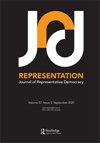衡量一致性:如何在选民和政党之间达成意见一致性的可靠措施
Q2 Social Sciences
引用次数: 0
摘要
摘要选民和政党在政策上达成一致的程度是政治学家实证研究政治代表性的一个重要途径。这种意见一致性通常是通过比较对一些政策声明的偏好来衡量的。虽然政策声明的选择并没有逃过学术界的关注,但它对一致性得分的可靠性的影响,即当使用不同的政策声明样本时,发现相似程度的意见一致性,却很少被研究。本文考察了陈述样本和选民的哪些因素影响一致性测度的可靠性。它通过在包含134个选民和政党政策偏好的数据集的基础上模拟500多万个意见一致性得分来做到这一点。研究发现,陈述的数量和主题的多样性都对同余估计的可靠性产生了积极影响。此外,政治上不那么老练的选民的一致性估计更可靠,但只有当许多左右政策声明被纳入声明选择时。最后,探索性分析表明,增加话题多样性也会增加一致性测度的有效性。本文章由计算机程序翻译,如有差异,请以英文原文为准。
Measuring Agreement: How to Arrive at Reliable Measures of Opinion Congruence Between Voters and Parties
ABSTRACT The extent to which voters and parties agree on policies is an important way through which political scientists have empirically studied political representation. This opinion congruence is most often measured by comparing preferences on a number of policy statements. While the selection of policy statements has not escaped scholarly attention, its impact on the reliability of congruence scores, i.e. the degree to which similar levels of opinion congruence are found when different samples of policy statements are used, has been less investigated. This article looks at which factors of statements samples and voters affect the reliability of congruence measures. It does so by simulating over 5 million opinion congruence scores on the basis of a dataset containing 134 voter and party policy preferences. It finds that both the number of statements and their topic diversity positively affect the reliability of congruence estimates. In addition, the congruence estimates of politically less sophisticated voters are more reliable but only when many left-right policy statements are included in the statement selection. Finally, explorative analyses suggest that increasing topic diversity also increases the validity of congruence measures.
求助全文
通过发布文献求助,成功后即可免费获取论文全文。
去求助
来源期刊

Representation
Social Sciences-Sociology and Political Science
CiteScore
3.50
自引率
0.00%
发文量
31
期刊介绍:
This change in scope follows two paths. Firstly, it seeks contributors who are interested in exploring the interface between democratic practice and theory. In particular, this focus seeks contributions that apply theoretical insights to actual examples of current practice. Secondly, while not neglecting the current focus of the journal, we would like to expand its international coverage so that the journal will offer our readers insights in the state of democracy worldwide.
 求助内容:
求助内容: 应助结果提醒方式:
应助结果提醒方式:


